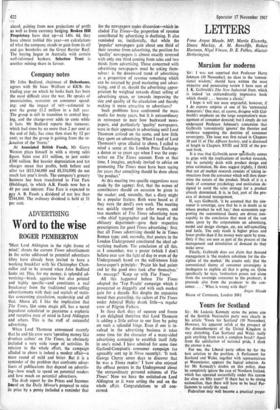Marxism for moderns
LETTERS
From Angus Maude, MP, Martin Elworthy, Simon Mackay, A. M. Rawcliffe, Robert Hartman, Nigel Vinson, D. E. Folkes, Alastair Hetherington.
Sir: I was not surprised that Professor Harry Johnson (10 November), no slave to the 'conven- tional wisdom,' should have written the most objective and penetrating review I have seen of J. K. Galbraith's The New Industrial State, which is indeed `an extraordinarily impressive book which should. . . become a classic.'
I hope it will not seem ungrateful, however, if I do express surprise at one of his 'ceremonial demurrers.' One may, of course, disagree with Gal- braith's emphasis on the large corporation's man- agement of consumer demand; but I simply do not understand Professor Johnson's contention that Galbraith 'conveniently ignores' the theories and evidence supporting the doctrine of consumer sovereignty. The issue was first raised in Chapters 10 and 11 of The Affluent Society, and is discussed at length in Chapters XVIII and XIX of the pre- sent book. • It is true that Galbraith never specifically comes to grips with the implications of market research, but he certainly deals with product design and price estimation. He does suggest (rightly, I think) that not all market research consists of taking in- structions from the consumer which will then deter- mine the nature of the product. Much of it is a study of consumer psychology and motivation de- signed to assist the sales strategy for a product already determined. It is, in fact, part of the pro- cess of demand management.
If, says Galbraith, 'it be assumed that the Con- sumer is sovereign, save that he is in doubt as to whose product he will buy,' then economists sup- porting the conventional theory are driven ines- capably to the conclusion that most of the vast sums spent by the corporations on advertising, model and design changes, etc, are self-cancelling and futile. The only result is higher prices and lower profits than if the money were spent by none. Only if they are seen as part of the process of the management and stimulation of demand do they make sense.
Finally, Galbraith does not claim that demand management is 'the modern substitute for the dis- cipline of the market.' He asserts only that the conventional theory of consumer sovereignty is inadequate to explain all that is going on. Quite specifically he says, 'instruction passes not atone from the sovereign consumer to the producer; it proceeds also from the producer to the con- sumer. . . .' What is wrong with that?


































 Previous page
Previous page